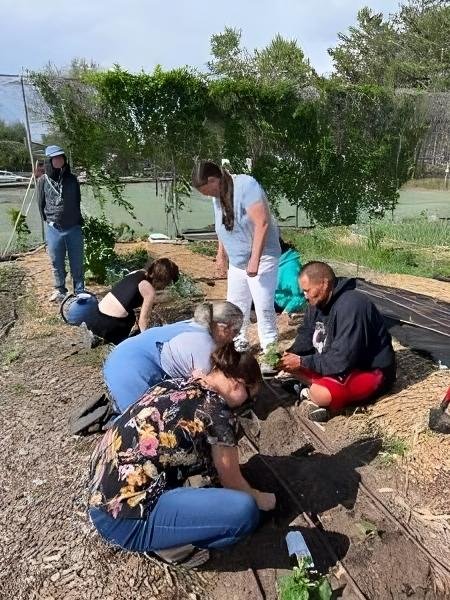Blog
Social Prescribing Program Spotlight: Project Connection
January 7, 2025
This month, we are spotlighting Project Connection, a mental health-focused social prescribing program based in Salt Lake City, Utah. We had the pleasure of interviewing Lennie Knowlton, the founder and executive director, who also hosts Sccial Prescribing USA’s monthly Community of Practice meeting.
Clients at Project Connection embracing community gardening as part of their social prescriptions.
Can you briefly describe your social prescribing program and how it started?
Project Connection is a mental health referred social prescribing program in Salt Lake City, UT that implements a “Relational Social Prescribing” model. I was inspired by the Bromley-by-Bow organization in London after reading Johann Hari’s “Lost Connections.” We have 45 therapists in our outpatient clinic and local schools and these therapists refer their clients for social prescribing services when it is determined that increased connection, meaning and value could improve mental health. Referred clients are assessed by our link worker team and referrals are made.
What types of prescriptions (e.g., arts, nature, volunteering) are most commonly referred through your program?
Client’s needs, values, personality, interests and engagement style are assessed in our social prescribing intake. The link workers then work with “community hens” to find groups, organizations and causes to find matches for clients. Prescriptions have ranged from in-home connection exercises with their own families, to grief support groups, community garden involvement and volunteering for organizations that make cakes for kids in need. We believe that interventions are most impactful when they matter to the client, when the client feels they can add value and when they are connecting with others in the process.
How is your program funded?
Most of our work is funded through the mental health billing codes for case management. The T1017 code allows for services that Coordinate, Assess, Link or Monitor and social prescribing is just that! We also have grant money that can fund individuals who do not have insurance that qualifies for that code. Grant money can also help support involvement with interventions if a fee is required. We are always looking to expand funding to bring services to as many clients as possible.
How has social prescribing impacted the health and well-being of the people you serve? What outcome measures do you use to measure that impact?
Connection is the foundation of mental health, and humans experience connection when they feel seen, heard and valued. Social Prescribing plays a critical role in ongoing wellbeing of clients and is a place where clients can bring the work they are doing in therapy into their everyday lives. We currently measure outcomes by client report, and the mental health Outcome Questionnaire (OQ/YOQ)
What advice would you give to others looking to start or expand social prescribing programs?
Look for people and organizations who are already doing the work (they may call it social prescribing or they may not)! Collaborate. Look for cracks in “the system” that will let the work start in ordinary places.

